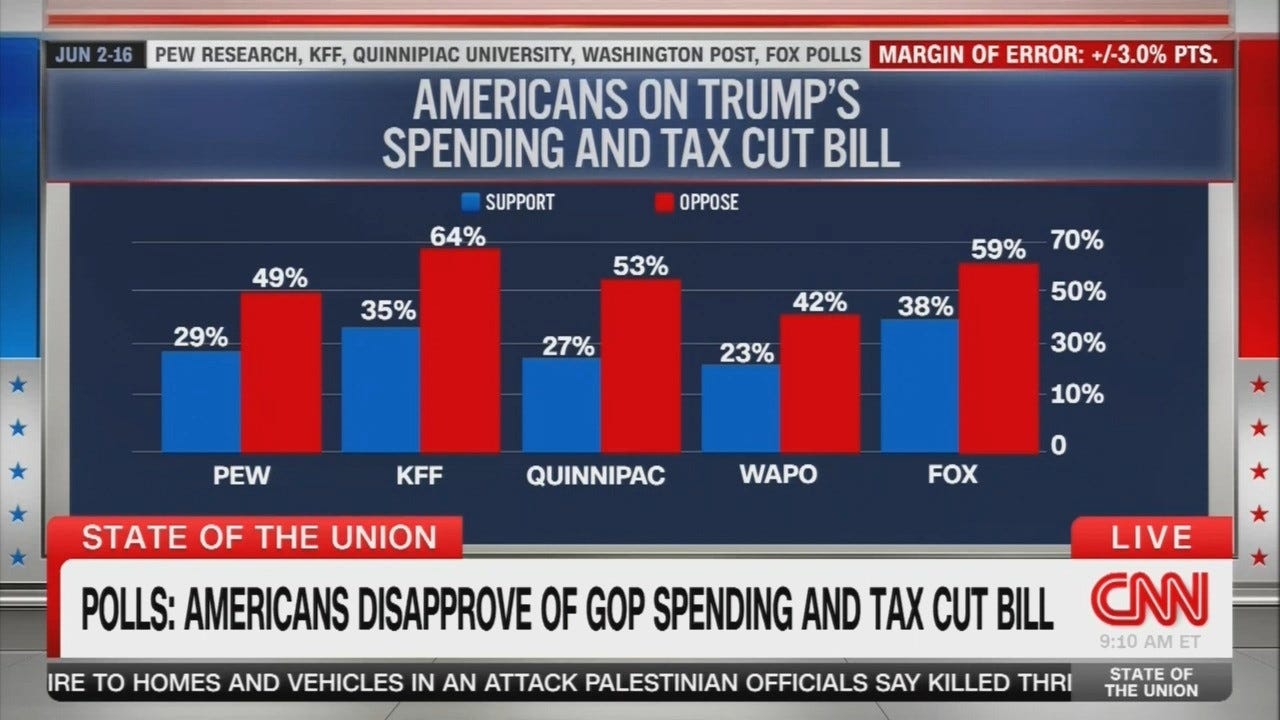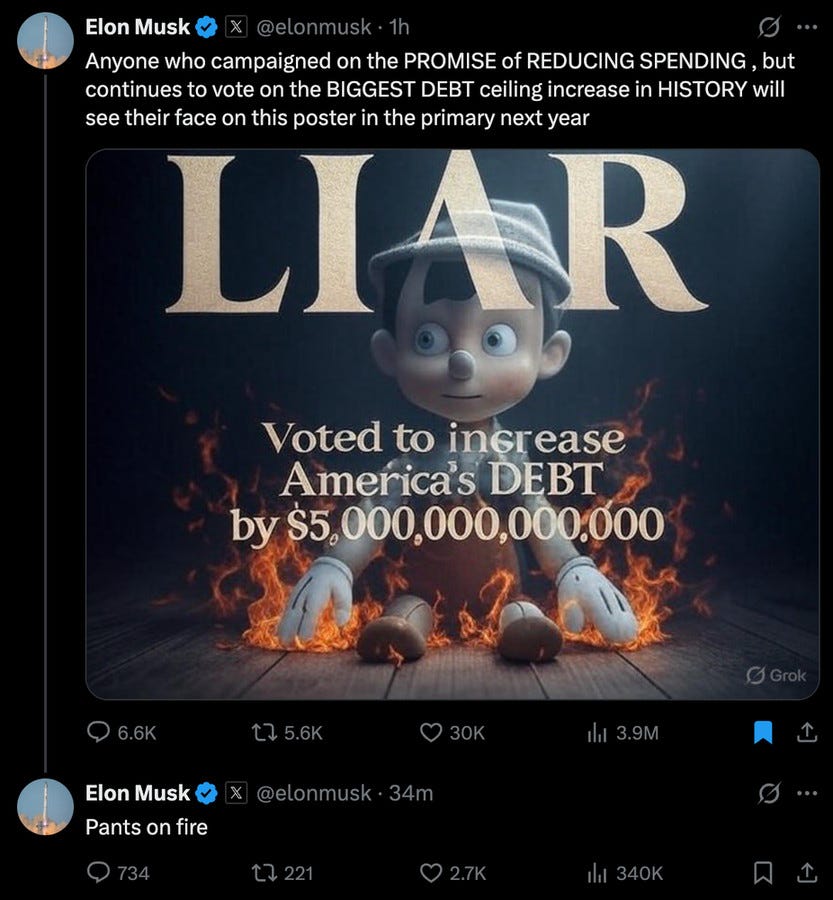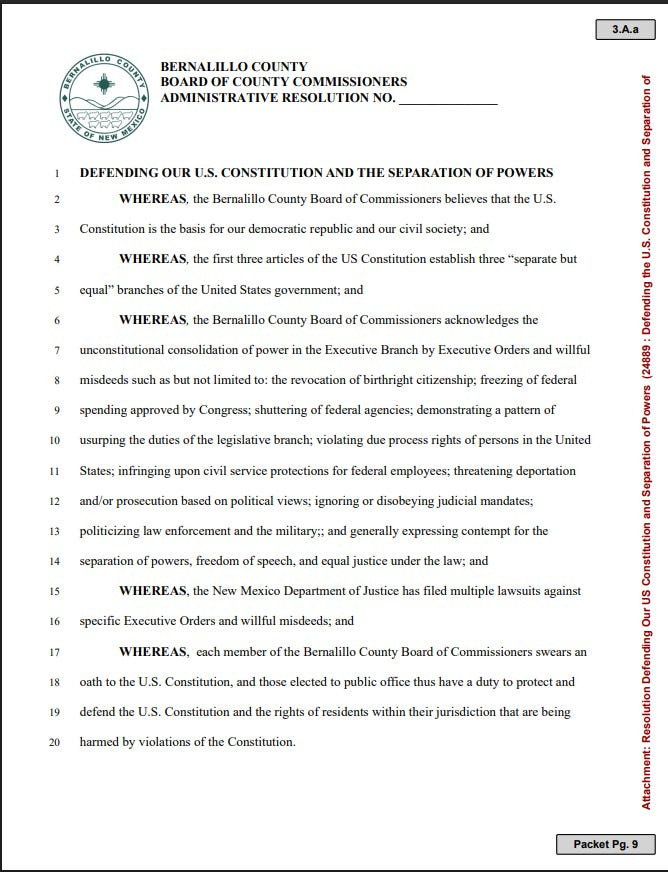The House Needs To Hear A Roar Of Disapproval From The American People Today - Let's Get To Work Everyone!
Paid Subscribers Gather Tonight at 7pm ET, DNC "Organizing Summer" Meeting at 8pm ET
Morning all. Huge uncertainly about what happens to the big, ugly bill now that it goes to the House. Weather delays may keep the House from voting until tomorrow. Lots of grumbling as this bill simply is not what the House thought they were going to get. Here’s Punchbowl News this morning:
We spoke to several people on the House GOP whip team Tuesday night who were expressing alarm about what they’re seeing on their whip cards. These sources said that they were racking up no’s from lawmakers who they didn’t expect would be opposed to the bill.
Again, it is likely the bill passes in the next 24 hours but as we learned with the Trump’s failed effort to repeal the ACA in 2017 nothing is pre-ordained in this business, and we just have to keep working as hard as we can.
If you have live in one of these 29 Republican seats please contact your House Member today. Call, email, get everyone you know to join you. Contact your state and local Dem party and see if you can join some broader effort. Use whatever works for you - savage assault on our health care, unacceptable undermining of our clean energy future and vital manufacturing jobs, dangerous deficits, reckless expansion of the “royal” Interior Ministry. And if you don’t live in one of these 29 districts call, contact your Rep anyway. Congress needs to hear a roar of disapproval from the American people today!!!!!!!!!!!!!!!!!!!!!!!!!!!!!!!!!!!
Remember this thing is incredibly unpopular:
Elon has gotten big mad in recent days for this thing is 100 percent the worst bill ever:
Here’s Senator Murkowski last night being confronted on her selling out the country. WATCH THIS. They know they’ve done something terrible.
Another reason to keep fighting - because we are now up against something that has become truly evil:
Good luck today everyone. Don’t obey in advance. Do. Make your calls, contact your Reps, call your Governor or support one of these many important Hopium projects below. Sign up for our paid subscriber call tonight and/or join the kick off to the DNC “Organizing Summer” campaign at 8pm ET. Action is what is required today not acceptance. We must keep fighting. The circle of defiance needs to continue to grow. We must leave it all out there on the playing field, together, for our kids and grandkids and all the kids and grandkids of the world. That is our obligation and responsibility. Now….
Let’s Get To Work!!!!!!!!!!!!!!!!!!!!!!!!!!!!!!!!!!!!!!!!!!!!!
Support Hopium’s Priority Candidates - Friends, you all rallied these last few days. We hit our $25,000 goal for our newly endorsed Rep. Mikie Sherrill and Senator Jon Ossoff - thank you! Our revised fundraising goals are for Labor Day, remarkably, only two months away, with the November elections now only four months away. We can do this people!!!!!!!!!!!!!!!!!
Mikie Sherrill NJ Gov - $200,000 goal, $29,000 raised - Donate | Learn More | Volunteer | Watch Our Interview
Abigail Spanberger VA Gov - $250,000 goal, $146k raised - Donate | Learn More | Volunteer | Watch Our Interview
Jon Ossoff GA Senate - $200,000 goal, $26,000 raised - Donate | Learn More | Volunteer
Hopium House 7 - $250,000 goal, $153k raised - Donate | Learn More, Volunteer, Watch Our Interviews
We also have ongoing campaigns to support the new DNC, the Anderson Clayton and the North Carolina Democratic Party and to thank Senator Cory Booker for his spirited leadership in a time of enormous challenge. Lots of choices - do something to support these great candidates and parties today!




1 - Stop The Reconciliation Bill - Job One for us this summer remains fighting Trump’s ruinous and deeply unpopular economic agenda. We need to keep calling every day and demand our leaders vote down the reconciliation bill and roll back Trump’s terrible tariffs. This is the big, definitional battle of the summer and we need keep working it every day. Those of you in states with Republican Senators and Representatives have a particularly important role to play now.
Here’s a possible script to use to fight the reconciliation bill and tariffs. Use whatever works for you:
I am calling to urge you to vote against the reconciliation bill and to roll back Trump’s terrible and illegal tariffs. Together these actions have raised taxes on all of us and will explode the deficit - things Republicans have always told us they did not believe in.
But your agenda is also causing all of us to “pay more and get less” for every day things including our health care; people to loses their jobs; and the economy to slow - all so you can give your rich donors a huge tax break. Your plans will weaken this great country and are an extraordinary betrayal of everything you promised during the campaign - which was to help people like me, not Elon Musk, get ahead.
Your plans are ones of sabotage, surrender and betrayal and I urge you to abandon them and to work with Democrats to find a better way.
2 - Get The Military Off Our Streets, Fight Trump’s Inhumane Immigration Escalation - Contact your Rep and Senators to demand they fight Trump’s illegal use of the National Guard and Marines in California. Encourage Democrats at all levels of government to a stand with Governor Newsom and the California - for Trump is not just attacking California, he is attacking the rights and freedoms of all of us. See my recent interviews with Joe Garcia, Leon Krauze and Senator Chris Van Hollen for more.
In the coming days I want to work with all of you to do something more explicit about demanding the end of masked, plain clothes “police” snatching people here in America without warrants.
3 - Own The Fourth, The Flag And Patriotism - To keep our momentum going after the remarkable No Kings events I encourage you to explore ways of Owning The Fourth and make our Independence Day an ugly one for our mad wannabe king.
Inspired by the tactics of our Founders, learn about how Hopium members are advancing “resolutions of condemnation” in their communities across the country and consider bringing this initiative to your state, country or city/town. Our resolutions passed in New Mexico last week, and we now have 38 resolutions moving in 13 states - let’s keep the mo’ going everyone!
4 -Volunteer To Help Your State and/or Local Democratic Parties Stand Up Voter Registration Efforts - In the presentation he made to our community recently Tom Bonier made a persuasive case that Democrats must once again make partisan voter registration a national priority. State and local Democratic Parties are in the planning stages to take this on. Members of our community should consider contacting their state and local parties and offer to help stand up these vital efforts in the coming months.
For more on the need to make partisan voter registration great again see my recent interview with Jane Kleeb, Nebraska Democratic Party Chair, DNC Vice Chair and President of the Association of Democratic State Committees.
On Monday the DNC, the DSCC, the DCCC, the DGA and the ASDC announced a major new “Organizing Summer” project. Learn more about it here, and there is a kick off call tonight at 8pm ET. I hope to have someone join us in the coming days to help us understand how we can support this exciting new initiative:
Today, on the heels of town hall spring, the DNC, DCCC, DSCC, DGA, and ASDC announced a new “Organizing Summer” program to build Democratic enthusiasm across the country ahead of the November 2025 elections and the 2026 midterms to fight back against Republicans’ tax scam that will take health care and food away from millions of Americans while gifting Trump’s billionaire backers a massive tax break.
“Organizing Summer” is an organizing campaign – featuring in-person and virtual events and activations to cultivate a robust volunteer base ready to put pressure on Republicans, and ensure that state parties are registering voters ahead of crucial elections in November and the midterms in 2026.
The DNC, ASDC, DSCC, DGA, and DCCC will expand the DNC’s distributed organizing program by hosting activations and organizing events in key Gubernatorial, House, and Senate battleground states: Alaska, Arizona, California, Colorado, Connecticut, Georgia, Florida, Illinois, Iowa, Kansas, Kentucky, Maine, Maryland, Massachusetts, Michigan, Minnesota, Missouri, Nebraska, Nevada, New Jersey, New Mexico, New York, North Carolina, Oregon, Ohio, Pennsylvania, Rhode Island, Tennessee, Texas, Virginia, and Wisconsin.
5 - Stand Up For Science - Sign on to the critically important Bethesda Declaration and watch my interview with Stand Up For Science’s Executive Director Colette Delawalla. Signing on to the Declaration is one concrete way you can take action today. Another is to back over 700 employees of the EPA who have taken a courageous stand challenging EPA Administration Lee Zeldin this week. You can learn more and sign your name in support of this remarkable effort here.
For more on the need to fight Trump’s war on science, research, academia and our public health see my recent interview with noted climate scientist Dr. Michael Mann.
Please self-report your activities to our daily paid subscriber chat. These reports help inspire all of us to do more and fight harder!
Grow Hopium - We’ve set a goal of trying to grow the Hopium community from the 152,000 we are now to 175,000 by Labor Day. Do what you can to encourage your friends, family and colleagues to become a summer subscriber to Hopium, free or paid. If each current paid subscriber brings in just one new subscriber this summer we will hit our goal. To encourage the growth of our community annual paid subscriptions are 10% off through Labor Day!
Keep working hard all. Proud to be in this fight with all of you, and a fight it surely is - Simon







Not sure folks posted about this yet - WI SCOTUS strikes down 176 year old abortion ban
https://apnews.com/article/wisconsin-abortion-ban-1849-01658358639a63db7df92aeec34c612d
This community raised a lot of money and did a great deal of work to elect the last two WI Supreme Court Justices. Congrats everyone!!!!!!!!!!!!!!!!!!!!
Senator Murkowski's selling out to party over country is reprehensible. Bribery is nothing short of disguising spineless cowardice by bending a knee to her GOP colleagues. There are profound consequences of a politician accepting obsequiousness. Let me explain.
The act of casting a vote is, in its purest form, a sacred civic duty, a cornerstone of democratic governance. It is meant to be a deliberate, conscience-driven decision, made with the collective good of the nation at its heart. To accept a bribe in exchange for prioritizing party over country, however, is to fundamentally corrupt this process, embedding consequences that ripple far beyond the immediate transaction, ultimately eroding the very foundations of a just and functional society.
Firstly, such an act shatters the public's trust in the electoral system and, by extension, in government itself. When votes are perceived as commodities to be bought and sold, the legitimacy of elected officials diminishes. Citizens become cynical, believing that their voices are irrelevant compared to the influence of money. This cynicism can lead to widespread apathy, discouraging participation in future elections and weakening the democratic spirit. A populace that believes its leaders are beholden to private interests rather than public service is a populace disengaged and disillusioned, ripe for instability.
Secondly, prioritizing party over country, especially under duress of a bribe, inevitably leads to policies that serve narrow, partisan agendas rather than the broader national interest. Decisions on critical issues—be it economic policy, healthcare, education, or foreign relations—become skewed, designed to benefit a specific faction or donor rather than the entire citizenry. This can result in short-sighted, inefficient, or even harmful legislation. For instance, a bribe might lead to the approval of a project that is environmentally damaging but profitable for a specific company, or the rejection of a much-needed social program because it doesn't align with a party's strict ideology, regardless of its benefit to the people. The long-term health and prosperity of the nation are sacrificed for immediate, illicit gain.
Furthermore, the acceptance of bribes fosters a culture of corruption that permeates all levels of governance. If one vote can be bought, why not others? This creates a dangerous precedent, incentivizing more illicit transactions and making it increasingly difficult for ethical individuals to operate within the system. It normalizes unethical behavior, making it harder to distinguish between legitimate political contributions and outright bribery. This insidious spread of corruption diverts resources, stifles innovation, and ultimately undermines the rule of law, as those who uphold it may themselves become compromised.
In conclusion, accepting a bribe to vote party first and country second is not merely a personal moral failing; it is an act of profound civic betrayal. It corrodes public trust, distorts policy-making, and cultivates a pervasive culture of corruption. The embedded consequences are a weakened democracy, a disillusioned populace, and a nation whose future is mortgaged for the fleeting gain of a few. The true cost of such a vote is the slow, steady unraveling of the social contract and the collective aspiration for a just and prosperous society.